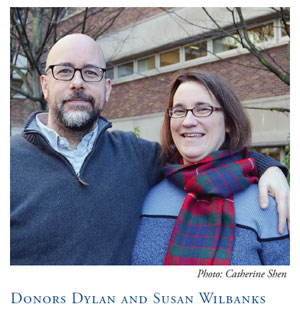The story behind the Rattlinggourd Endowed Scholarship and Fellowship established by Dylan and Susan Wilbanks runs along the Cherokee Trail of Tears— from the South to Oklahoma in the 1800s, to the oil boom around Tulsa in the early 1900s. The story finally lands in the present day in the UW School of Public Health (SPH).

Rattlinggourd was the last name of Dylan's Cherokee great-grandmother. Susan is part Creek Indian, from Alabama. Their Rattlinggourd scholarship provides support to School of Public Health students whose work and research will benefit Native American and Alaska Native communities.
Generations ago, Dylan's family, who had originally arrived in Oklahoma via the Trail of Tears, amassed wealth from oil-rich land outside Tulsa. However, the money left a painful legacy as it was reduced over half a century by family squabbles and questionable decisions. When Dylan received an inheritance of BP stock in 2008, he thought of it as "blood money." He says, "How many Natives in Oklahoma traded their mineral rights to oil companies for the price of a Cadillac?"
At the time, he was working in online communications at SPH and knew its mission, students and faculty. "I loved the SPH mission, but I would look at the Soul Catcher (emblem) and think there was something missing, that we did not do enough for Native communities. I thought, let's take this money and aim some of our students towards Native communities in North America, which face alcohol problems, obesity, diabetes, economic inequality—and have for a long time. It felt right to me. SPH is the right school; these are the right people."
Susan adds, "We are not rich; we're middle-class Seattle folks. At the end of the last campaign, the UW offered a very generous match, so we took advantage of it to establish this endowment."
Says Dylan, "When I was young, I thought I would save the world. As I got older I thought, there are a lot of people who do that, but they need people who can support them. I've realized I'm better at supporting the people who are saving the world."
